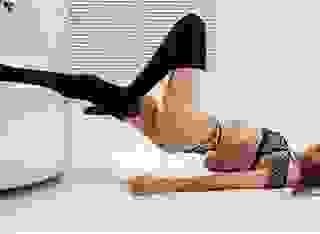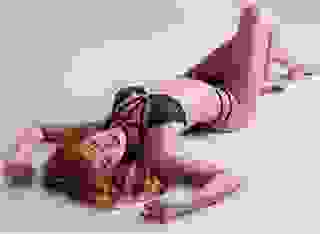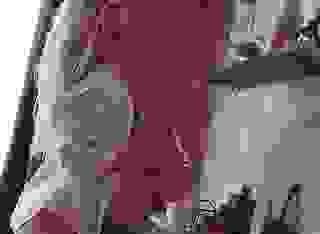Note: You can change font size, font face, and turn on dark mode by clicking the "A" icon tab in the Story Info Box.
You can temporarily switch back to a Classic Literotica® experience during our ongoing public Beta testing. Please consider leaving feedback on issues you experience or suggest improvements.
Click hereHua knelt there, quietly sobbing. I looked at the headless bodies and the blood and I threw up. No-one even looked. The show was over.
"You two have had a narrow escape," the white man said, a knife appearing in his hand. "You are fortunate I know Mrs. Innes." A particularly evil looking knife with which he sliced through the ropes that bound our wrists, lifting us to our feet when we couldn't stand by ourselves, waving over a rickshaw coolie, climbing in with us, sitting beside us as we sat there, trembling.
The rickshaw coolie jogged along, taking us out of the old City, into the French Concession, back towards our school. We passed under Zhang's head, contained within a birdcage, already hanging over the city gate and I almost threw up again.
"Do not go back to Nantao ever again," the foreigner said as the rickshaw halted outside our school. He climbed out, paid the rickshaw coolie, handed Hua and I down. "If that policeman sees you there, he will execute you on the spot."
Neither Hua nor I ever ventured into Nantao again. Zhang's head leaping from his body and rolling across the paving stones as his neck spurted blood featured in my nightmares for weeks. Shanghai had taught Hua and I our first harsh lesson in the realities of life in the City that never sleeps. Life was cheap. Death came quickly and unexpectedly. Nobody cared if you lived or died.
This was a lesson that Hua and I would learn all too well.
That was the way it was in Shanghai.
"They look so stylish," I said to Hua, watching three girls in the latest Modeng style, "modern girls," walking together. Dressed in the style of foreigners; short skirts, high heeled shoes, bobbed hair, and it was their hair that Hua and I examined.
"Is that the American flapper style?" Hua asked me.
"I think so," I said. "I like their hair."
"I'm not sure I want to look like a Modeng girl," Hua said. "You know what people say about them."
I did. We both did. Women of the New China, some said. Revolutionaries, against foot-binding and neither of us thought that was radical. My grandmothers both had the lotus feet and I knew how painful it was for them. My mother had escaped that and she had been adamant that her daughters would not suffer the pain of that horrible practice, despite some pressure from my paternal grandfather.
"I'd like to," I said, watching those girls.
Elegant, assured, confident. Everything I wanted to be. I'd read an old article in the Mingxing yuekan, "The Star Monthly," recently, describing the Modeng Girl's favorite pastimes. "Taking a boyfriend for a stroll at dusk under street lights that had just come on; visiting the park with a boyfriend on a moon-lit night when flowers are in full-bloom; drinking coffee in a café; going to the movies; and going dancing in the dance halls."
Hua and I, we looked like what we were. Students at a foreign school. Our uniforms identified us as such. To a certain extent perhaps they protected us, but I did not see that. I saw those Modeng girls, I saw the way men eyed them, I saw the way girls such as Hua and I looked at them. Enviously. With admiration, for these girls were the New China. The New Women. The future.
Modeng girls were not bound by the restrictions of the past, the chains of the patriarchal Confucian society in which we had been brought up. These girls were free. Free to enjoy amorous relationships with the opposite sex, free to stroll through the streets and the boulevards, freed to sit in cafes, watch movies, go to dance halls and dance with young men, all those things and more.
Modeng girls were progressive, intellectual, involved in radical politics and bettering women's position in society although of course I had also read the gossip columns accusing Modeng girls of being empty-headed promiscuous young women preoccupied with trendy clothes and having fun. I did not care for that, but there was that appeal of looking fashionable, and style and appearance was everything in Shanghai.
So many advertisements showed Modeng Girls, the Modeng lifestyle so it wasn't just me.
"I want to get my hair bobbed like that," I said, watching those three girls walking away from his.
"I'll do it if you're going to," Hua said.
"Let's do it now," I said. "There's a hairstylists over there." We'd walked by it often, it was always busy and I'd seen Modeng girls in there, having their hair trimmed.
I led the way, Hua followed.
"A trim?" the young man smiled at us as we walked in. Young, handsome, he was dressed in the western style. I smiled back.
"We'd like to have our hair bobbed. Like that."
"This way," he said, leading us in.
"You two have lovely hair," the hairdresser said. Mine fell to my hips, long and black and silky. Hua's was longer even than mine, and neither of us had ever had our hair cut since we were born. Only trimmed a little. She lowered her voice. "Are you sure? Most of the girls who have their hair bobbed, they are involved with the Chung-kuo Kung-ch'an-tang, the Communist Party or they are girls with no virtue."
"We are neither," Hua said. "We want to look like her." The young woman with the bob having her hair trimmed.
"Her father is wealthy," the hairdresser said. "For her, it is fashion, and nothing else. She has a new boyfriend every week. Her body guard is there, the Russian."
We'd noticed him, an older man in a suit. Grey-haired, the bulge of a handgun beneath his jacket, and of course we knew. This was Shanghai. This was a fact of life, unnoticeable. If you had money or your family were wealthy, there were bodyguards.
"Nothing will happen to her because of her hairstyle," the hairdresser said.
"Why should something happen because of her hair?" Hus asked, as puzzled as I was.
"You girls do not know what happened in 1927 do you?" she asked, her voice hushed.
"No." I shook my head. "I was eight years old then. I lived in Nanking."
Hua nodded. "I lived in Chungking."
"It was terrible," the hairdresser said. "I was your age then, when the Communist Party launched the uprising in Shanghai and took control of the city. In the end, Chiang Kai-shek allied with Du Yuesheng..." The leader of the Green Gang, and everyone knew who Du Yuesheng was. "...and the gangs and they attacked the workers militias and executed thousands. It wasn't just the workers though. They rounded up every girl they saw with bobbed hair."
She shook her head. "I was a hairdresser then, some of those girls, I cut their hair for them. They weren't revolutionaries. They weren't communists, like they said there were. They were just silly young girls who liked to follow the latest foreign fashion and they said they were communists and they cut their heads off or they shot them. The only reason was that they didn't like bobbed hair. They thought if a girl bobbed her hair she was a revolutionary because so many of the progressive girls, they bobbed their hair, they said long hair was the old way that kept women oppressed. They killed them because they bobbed their hair. A lot of them still think like that."
"I don't think I'll have my hair bobbed after all," Hua said.
"I don't think I will either," I said, and I didn't.
That was the way it was in Shanghai.
Death came for many reasons.
"They cut girls heads off and killed them because they had their hair bobbed," Tien-chien interrupts me, incredulous.
"Yes," I said. "They did. I asked, later. I asked people who were there in Shanghai when it happened and it was all true. One of the men I knew a little later, he was on a tram that day it all started. He said there was a girl seated in front of him, a student in her school uniform. She was reading a textbook, studying for an exam, she was making notes. They came onto the tram and dragged her off and she screamed, she begged them to stop. Told them that she was a student going to school and they ignored her. They told her she looked like a Modeng girl and she could join the rest of them."
I remember the look in his eyes as he told me. He'd been horrified, even ten years later. "He said they dragged her off the tram and made her kneel on the road next to all the other bodies and they shot her right there. He never knew who she was, she would have just disappeared. Her family would never have known what happened to her. She would have left in the morning to go to school, and simply never returned."
"That's horrible," Tien-chien said.
"It sounds awful now," I said. "It was worse when you were there and you saw things like that happening." I think back to that boy I knew from Nanking and his two friends, beheaded before my eyes. His head rolling on the cobblestones as Hua and I knelt there. The sick horror of that dawning realization that our heads were next. That in seconds our heads would join his. We would be dead for no crime except that I had waved to him.
And nobody had cared. Nobody had cared except that English policeman.
"I know how those girls must have felt," I said, slowly. "Their only crime was wanting to look attractive, to dress in the Modeng style, to cut their hair in that bob, and it was very fashionable. For that, for wanting to look stylish, so many of them were dragged of the street and killed."
There are tears in my eyes now for those girls, those hundreds of unremembered girls who died over the weeks of that ruthless massacre where thousands were killed. Forgotten, those girls are all forgotten and who remembers them now, those Modeng girls who were killed for the way they cut their hair. Who knows what happened to those poor girls before they were executed.
Girls like me.
"That is the way it was in Shanghai," I said at last. "When you understand that, you will understand me better, Tien-chien. Life was so cheap back then. Nobody cared. Nobody at all, often not even their families and life went on, unchanged, as if none of it had ever happened. When you had nothing, you did what you had to do to survive, or you died, and if you died, nobody at all cared for you. Nobody."
"You had your friend, Hua, Grandmother," Tien-chien says and she is right, this great-granddaughter of mine. Hua cared for me, I know that. Just as I cared for Hua.
"Yes," I say, slowly. "Hua and I, we had each other back then. That was all we had in the end. Each other, and we helped each other survive when without that friendship, I think each of us would have given up and died."
There was enough there for us in the International Settlement and the French Concession, more than enough for us in those streets where the Europeans ruled. After the horror of Zhang's death had worn of, we ventured out again, cautiously, carefully. Shopping on Nanking Road, sometimes taking a rickshaw into the French Concession, drawn by the croissants and pastries and the coffee, so different to Chinese delicacies and I did like coffee. There, in our western-style school uniforms, we were safe. We blended in for while there were many foreigners, there were far more Chinese.
Chinese like us.
The Bund fascinated both Hua and I. The Bund, stretching along the bank of the Whangpoo, it was the most famous street in the International Settlement, it exists today, with many of the old buildings I remember preserved in time. A beautiful park, open to all, even to Chinese, stretched along the waterfront while on the opposite side of the road were the buildings I loved to look at, to sketch.
Back then, when I was fifteen, my ambition was to become an architect, to design modern buildings that would reflect the greatness of a resurgent China. It would not be, I would never get beyond my second year of studying Engineering at the National Chiao Tung University, known even in those years of the 1930's as the "Eastern MIT."
Fate played its part, my studies would take a far different direction, but still, I am proud to see now how Shanghai has blossomed, once more one of the leading cities in the world. I am proud to see how Chinese architects have created buildings to rival any in the world, making Shanghai now a city of architectural marvels. American as I now am, yet I am proud to see my China resurgent.
Not quite matching the vision of Sun Yat-Sen, but I know my father would be content if he could see China now, united, strong, modernizing, taking once more its rightful place at the forefront of the world. Fate, destiny, bad luck, call it what you will. I played no part in that resurgence. With my family background, it is unlikely that I ever would have, even had I stayed.
The communists sent many whores to the labor camps when they seized power. With my family background and my means of surviving, if I had remained in Shanghai I would have been lucky if that was all that happened to me. I escaped that fate, I escaped Shanghai, but that was in my future back then, in late 1936, in my seventeenth year, in my fourth year at the American School for Girls. Back then, I was filled with ambition and hope.
Back then, I happily spent Saturday afternoons sketching those buildings along the Bund. The Bund. How can I describe that single mile along the banks of the Whangpoo. A solid mile of buildings built by the foreigners, stretching from the Garden Bridge over Soochow Creek to the old Chinese City where Hua and I had nearly lost our heads. This was modern Shanghai.
Alive with noise, foreigners and Chinese intermingled. Businessmen, visitors, peddlers, beggars, throngs of pedestrians, rickshaw coolies calling, competing for business. Vehicles of every sort. Carts, bicycles, rickshaws, wheelbarrows, motorcycles, cars, buses, trucks. The Whangpoo, stinking, noxious brown water, colored with oil from the boats that chugged everywhere, layers of detritus mixed with dead fish and who knew what else.
I did not come to the Bund to admire the Whangpoo. Nobody did that. I turned my back to the river and its fetid stench. Instead I admired and I sketched those buildings along the length of that glorious mile. A mile that held half the wealth and power of the Orient, and Hua and I were there, in the center of things and this was the golden age of Shanghai, when the Bund was at its most vibrant.
The McBain building at number one, built in a mix of neoclassicism and eclecticism with baroque touches. Simple. Elegant. Magnificent, I loved that building. The Shanghai Club at number two with its 100 foot long bar of dark polished mahogany. The longest bar in the world and I would never see it, for Chinese were not permitted in the Shanghai Club and neither were women. Perhaps I would never see the interior, but I sketched that exterior again and again. The baroque style exterior of stone, the huge windows, the columns, the imposing double doors.
The Union Building at Number Three, occupied by the Chartered Bank of India, Australia and China; the exterior baroque again, the columns in the ionic style. The Nishin Navigation building at number five with its modern design combined with elements of the Japanese. The China Merchants Bank at Number Six, in the Victorian Gothic style, and how I studied those architectural styles. I knew every nuance, I could sketch every detail, smiling as I contemplated my own architectural designs of the future, following my graduation.
Like every young girl, I had my dreams, my ambitions and in that long ago time, mine was that one of my designs would grace a renewed resurgent Shanghai. And so, I sketched, learning with every sketch that I drew, every treatise on architecture that I read. The Telegram Building at Number Seven in the French Renaissance style with those two baroque domes with the rococo touches. The Russell & Co. Building at Number Nine, only three stories in the neoclassical style.
The Hong Kong and Shanghai Bank Building at Number Twelve, the most outstanding piece of Western classical-styled architecture in all of China. The Customs House at number thirteen with its huge clock tower. The beautifully art-deco China Bank of Communications building at Number Fourteen. The Russo-Asiatic Bank Building at Number Fifteen in the Italian Renaissance style. The Taiwan Bank Building at Number Sixteen. The North China Daily News building at Number Seventeen with its modern neo-classic look, all mixed in with baroque towers, sculptures and classic pillars.
The Chartered Bank at Number Eighteen, the Palace Hotel at Number Eighteen, at the corner of Nanking Road and the Bund and as I sketched it, I stood wishing I could see the inside of that beautiful building, little knowing that in two short years I would become all too intimately familiar with the interior of its rooms as the "guest" of foreign men. Sassoon House at Number Nineteen, built for the wealthy Jew, Victor Sassoon, his home a pyramidical green glass penthouse at the top.
The Bank of China Building at Number Twenty Three. The Yokohama Specie Bank at Number Twenty Four, the Yangtze Insurance Building at Twenty Six, the Jardine Matheson building at Twenty Seven. The Glen Line Steamship Building at Twenty Eight. The Banque de l'Indochine Building at Twenty Nine, and at the far end, the British Consulate Building set in its manicured green lawns.
I sketched them all, again and again. Hua, always the entrepreneur, happily sold my sketches to tourists, the proceeds going towards our shopping expeditions. I enjoyed myself, becoming ever more skilful, even attempting sketches of Hua.
Her beauty proved even more popular, both then and, as it turned out, later.
I even sketched Garden Bridge but neither of us ever crossed that bridge. It was the bridge between the western-controlled part of the International Settlement and Hongkou. The Japanese section. Japanese warships were anchored in the river. Japanese soldiers patrolled the streets. Not just soldiers. The Kempetai, the dreaded Japanese Military Police, a name to be whispered in fear, for they dragged Chinese off the streets, seemingly at random, never to be seen again.
We were there one Sunday when that happened. I was sketching the bridge when the Japanese dragged a Chinese man away, out of the crowd of Chinese passing through the Japanese checkpoint. He was screaming with fear, screaming like a girl, his voice a wail of terror before they beat him into silence and dragged him away.
"I never want to come here again," Hua said, crying, as we hurried away.
"Let's go shopping on Nanking Road," I said. And we did.
It was one of those shopping trips, it was in 1937 I am sure, because it was just before the fighting with the Japanese began again, that took our thoughts down a new path.
We ventured often into the French Concession now, exploring the streets, the Chinese shops tucked away down crowded side-streets and alleys. It was one such shop, a small shop selling old Chinese books, that drew us one Sunday afternoon. It must have been in early 1937, it was well before the fighting started, for I remember it was Spring and peaceful, the trees blossoming. Both Hua and I enjoyed reading, Chinese books as well as English, and these were used books, old books, cheap. We leafed through them, eyes open for anything interesting. Anything unusual. Anything like...
"Look at this one, Chuntao," Hua said, glancing around, holding a book open for me to look at.
"What is it abo... aiyaaah!" My eyes flew wide open. "What is this, Hua?"
She giggled, closing the cover, pointing at the title. "The Plain Girl's Secret Way."
I took the book from her, opening it again. "Aiyaaah, it has illustrations." My eyes widened. "Of..." Of course I blushed.
Hua giggled. "Yes." Now she blushed. "I'm going to buy it."
I looked. "I think there are more."
At that time, in the spring months of 1937, shortly before the fighting in what would later be called the Battle of Shanghai against the Japanese began, we had not yet started our last year of High School studies. Both of us had also just turned eighteen and at times now our thoughts turned to more than our studies. We were young women after all, and Hua was more beautiful than I, and I was not unattractive.








